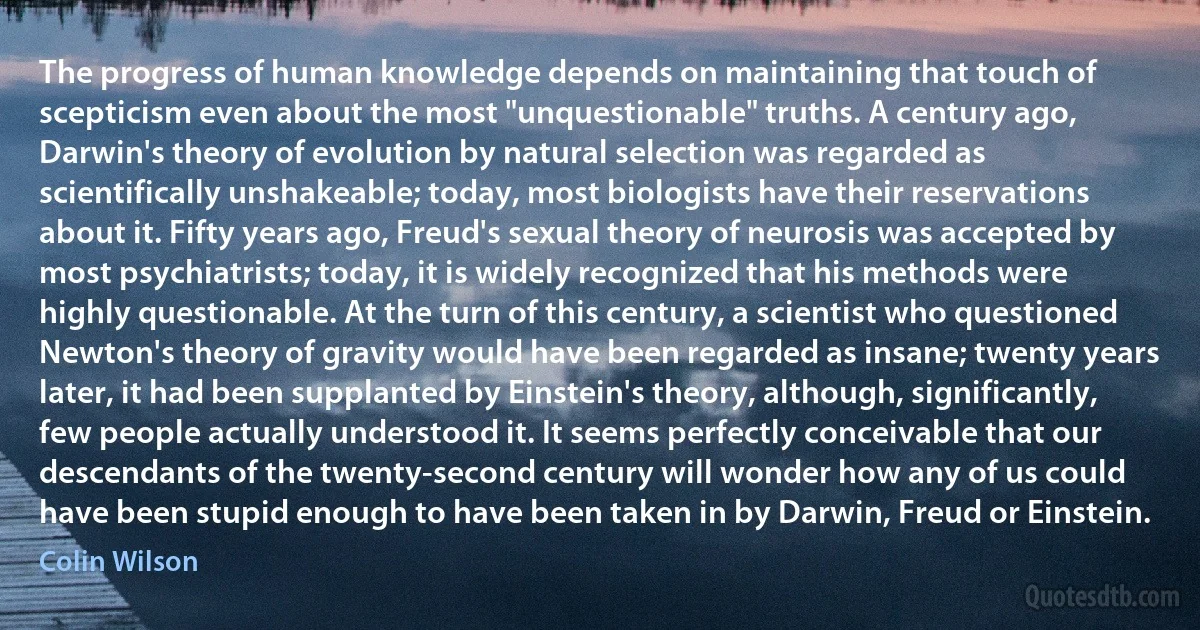
The progress of human knowledge depends on maintaining that touch of scepticism even about the most "unquestionable" truths. A century ago, Darwin's theory of evolution by natural selection was regarded as scientifically unshakeable; today, most biologists have their reservations about it. Fifty years ago, Freud's sexual theory of neurosis was accepted by most psychiatrists; today, it is widely recognized that his methods were highly questionable. At the turn of this century, a scientist who questioned Newton's theory of gravity would have been regarded as insane; twenty years later, it had been supplanted by Einstein's theory, although, significantly, few people actually understood it. It seems perfectly conceivable that our descendants of the twenty-second century will wonder how any of us could have been stupid enough to have been taken in by Darwin, Freud or Einstein.
Colin WilsonRelated topics
century enough evolution few fifty human knowledge later maintaining natural neurosis people scepticism selection stupid take touch turn twenty wonder today years einstein darwin freudRelated quotes
The most immediate result of this unbalanced specialisation has been that to-day, when there are more "scientists" than ever, there are much less "cultured" men than, for example, about 1750. And the worst is that with these turnspits of science not even the real progress of science itself is assured. For science needs from time to time, as a necessary regulator of its own advance, a labour of reconstitution, and, as I have said, this demands an effort towards unification, which grows more and more difficult, involving, as it does, ever-vaster regions of the world of knowledge. Newton was able to found his system of physics without knowing much philosophy, but Einstein needed to saturate himself with Kant and Mach before he could reach his own keen synthesis. Kant and Mach - the names are mere symbols of the enormous mass of philosophic and psychological thought which has influenced Einstein.

José Ortega y Gasset
The innovator, however, must in the first place be discontented, he must doubt the value of what he is doing or question the accepted ways of doing it. And secondly, he must be prepared to take fresh paths, to venture into fields where he is by no means expert. This is true, at least, of major forms of innovation; they make it possible for other men to be expert, but are not themselves forms of expertise. Freud was not an expert psycho-analyst; before Freud wrote there was no such thing; he created the standards by which psycho-analysts are judged expert. Neither was Marx an expert in interpreting history in economic terms nor Darwin an expert in evolutionary biology. If a man is trained, purely and simply, to be expert and contented in a particular task he will not innovate; Freud would have remained an anatomist, Marx a philosopher, Darwin a field-naturalist.

John Passmore
We do not inhabit a perfected world where natural selection ruthlessly scrutinizes all organic structures and then molds them for optimal utility. Organisms inherit a body form and a style of embryonic development; these impose constraints upon future change and adaptation. In many cases, evolutionary pathways reflect inherited patterns more than current environmental demands. These inheritances constrain, but they also provide opportunity. A potentially minor genetic change [...] entails a host of complex, nonadaptive consequences. [...] What "play” would evolution have if each structure were built for a restricted purpose and could be used for nothing else? How could humans learn to write if our brain had not evolved for hunting, social cohesion, or whatever, and could not transcend the adaptive boundaries of its original purpose?

Stephen Jay Gould
As a graduate student at Yale, I studied the whole of Christian theology but focused my attention on the Darwinian controversies. I wanted to get to the root of the conflict between Darwinian evolution and Christian doctrine. In the course of my research I learned (to my surprise) that biblical chronology played almost no role in the 19th- century controversies, since most theologians had already accepted geological evidence for the age of the earth and re-interpreted the days in Genesis as long periods of time. Instead, the central issue was design. God created the cosmos with a plan in mind. This affirmation is among the most basic in all of Christianity (and other theistic religions as well, including Unificationism). And that plan included human beings as the final outcome of the creative process: we are created in the image of God.

Jonathan Wells
Among all the luminaries shining in the sky, the sun is the chief, and in the Brahma-samhita the sun is accepted as the glowing eye of the Supreme Lord. There are fifty varieties of wind blowing in space, and of these winds the controlling deity, Marici, represents Krishna. Among the stars, the Moon is the most prominent at night, and thus the Moon represents Krishna. It appears from this verse that the Moon is one of the stars; therefore the stars that twinkle in the sky also reflect the light of the sun. The theory that there are many suns within the universe is not accepted by Vedic literature. The sun is one, and as by the reflection of the sun the Moon illuminates, so also do the stars. Since Bhagavad-gita indicates herein that the Moon is one of the stars, the twinkling stars are not suns but are similar to the Moon.

A. C. Bhaktivedanta Swami Prabhupada
